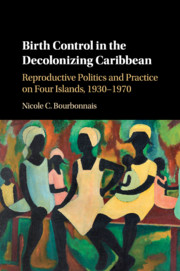 Birth Control in the Decolonizing Caribbean
Birth Control in the Decolonizing Caribbean Book contents
- Frontmatter
- Dedication
- Contents
- List of Figures, Maps, and Tables
- Acknowledgments
- List of Acronyms
- Introduction
- 1 The Answer, an Aid, a Right: Birth Control Debates and Social Movements in the Caribbean
- 2 From Politics to Practice: The Colonial Office, Foreign Activists, and Local Family Planning Clinics
- 3 Beyond Culture or Choice: Working-Class Families and Birth Control Clinics
- 4 A Matter of Cost: Reproductive Politics, State Family Planning Programs, and Foreign Aid in the Transition to Independent Rule
- Conclusion
- Bibliography
- Index
3 - Beyond Culture or Choice: Working-Class Families and Birth Control Clinics
Published online by Cambridge University Press: 06 January 2017
- Frontmatter
- Dedication
- Contents
- List of Figures, Maps, and Tables
- Acknowledgments
- List of Acronyms
- Introduction
- 1 The Answer, an Aid, a Right: Birth Control Debates and Social Movements in the Caribbean
- 2 From Politics to Practice: The Colonial Office, Foreign Activists, and Local Family Planning Clinics
- 3 Beyond Culture or Choice: Working-Class Families and Birth Control Clinics
- 4 A Matter of Cost: Reproductive Politics, State Family Planning Programs, and Foreign Aid in the Transition to Independent Rule
- Conclusion
- Bibliography
- Index
Summary
Trinidad's first birth control clinic held its opening session on September 20, 1956, in a building formerly occupied by the Church of Nazarene in Port Fortin. The clinic's founders (Shell Oil employee Dr. Beric Wright and his wife Joyce) and four local volunteers braced themselves for a difficult day. As noted in Chapter 2, local Roman Catholic leaders had vociferously protested the clinic on religious grounds, while others had branded it a plot by Shell Oil to control the fertility of the poor. Just a few weeks earlier, the opposition had called for a petition to the Colonial Secretary to prevent the opening of the clinic. But the day turned out to be relatively anticlimactic. As Beric Wright later recalled:
The oil company was concerned that there might be a minor riot. In fact all that happened was that the interested ladies, some of whom had come from Port of Spain, queued up to be photographed as the first patient!
By the end of the day, the clinic had seen seven patients, providing a consultation to each and distributing birth control methods for a small fee or free for those who could not pay.
Birth control advocates on other islands in the Caribbean were similarly encouraged by the response of local women to the opening of clinics. In Bermuda, Dr. Henry Wilkinson noted that they had seen dozens of women in the first few months of birth control services in 1937 and “inquiries & interest are increasing healthily” despite little to no advertising on the part of the Medical Department. By the end of its first year, the JBCL's clinic had attended to 335 patients, as well as receiving some 521 letters from women in the countryside. As Farquharson noted, in fact, these patients and letters came “a good deal too fast, because we are not ready to deal with them.” The half-day clinic established at the Speightstown Health Centre in Barbados by the BFPA in 1955 was getting anywhere between fifty and seventy-five women per session within a few months of opening, requiring the clinic to set up additional hours, and the Beth Jacobs Clinic in St. Ann's Bay noted that women were traveling from distant villages to seek advice.
- Type
- Chapter
- Information
- Birth Control in the Decolonizing CaribbeanReproductive Politics and Practice on Four Islands, 1930–1970, pp. 128 - 172Publisher: Cambridge University PressPrint publication year: 2016
